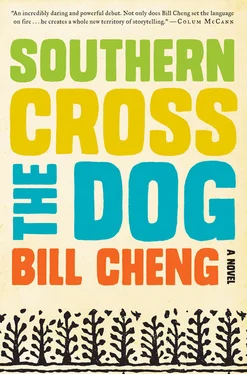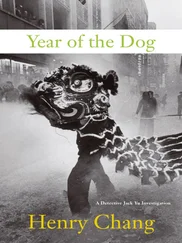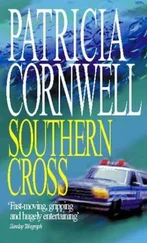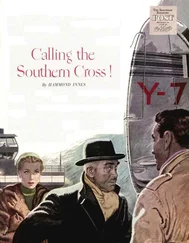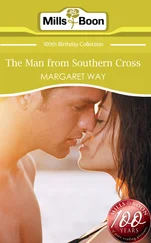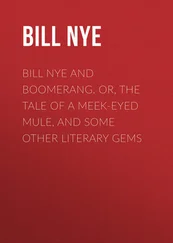And I could feel it, right then, actually feel myself stretching out. Feel my fingertips spanning outward until I was like a sail, flagged out against the wind, covering you, and me and our little boy, and I’d have no memory of who I was before. There weren’t no fear in it, and no regret, but just a very real anxiousness to see our future.
And in that future came our Little Robert. Robert was so much like you — quiet, full of seriousness. He’d sit alone for long hours, his thoughts zippered up inside him. He never smiled or sought attention, except from his brother, who he’d shadow dutifully all around the house. And our oldest boy took his role as an older brother seriously. He would protect him, his small trembling blood kin, in a way that not me nor you ever could.
Where we would look at Robert and only see our little boy, Billy could see another person. Someone who could be his equal. Billy would take pains to coax his brother out of himself. He’d play with him roughly, teach him to cuss, include him in that gang of young toughs that romped around the country backwoods.
And maybe that was what I had begun to fear. That Robert would be too much like his brother. Too wild. Too smart. Too cunning.
God, it works up a sting to think this. To say this.
Some part of me knew how my son would die. I could feel it like a needle inside my heart, when first I saw my baby boy kick in his father’s arms.
Do you remember years ago, when the boys had begged me to take them hunting?
You made us fatback and grits and we set out early — your three men, our bodies burning against the cold. We drove the mule out to Skinny’s where I rousted him out of bed and bartered for the loan of his new Henry rifle.
That day we drove down a public road, rounding a thickness of woods, and came to a spot I knew. I hitched the mule to a fence post. Then we packed up and loaded the rifles, me toting my old Enfield and Billy carrying the new Henry. Little Robert I let carry the cartridges of rimfire just to give him something to do. I showed them both how to hold a gun, how to look down it, how to charge the ball.
We went in through a break in the woods. I recall it was rough travel for Little Robert — being gashed everywhere by weeds and vines and thorns, trying to keep up with Billy and me. Still, he didn’t complain too much, just kept right on behind us.
When we got onto the trails, Little Robert and Billy kept quarreling over that rifle. Robert fussed and complained — Come on, let me hold it awhile. You held it enough — and Billy would growl back.
I told them roughly to hush. We went the whole morning, sullen and quiet, down the trails, pausing here and there to study over some dirt. I could see Robert watching that rifle in his brother’s hands, the long dark hollow of the barrel. Billy cradled the stock, keeping the nose pointed to the dirt like I told him, but when he thought I wasn’t looking, he’d mug with that Henry and tease his brother, smirking and stroking the hammer or petting the stock like it was some kind of pup. By the time we stopped for lunch, the injustice had brought Robert near to tears.
While we rested, I was trying to work myself down from an already mean and low mood. Do you remember? The night before, you’d told me how Billy had been fooling with some of the town girls, going with them off into the woods and getting into all kinds of trouble. You wanted me to set him straight and that’s what I’d aimed to do with this whole trip. Problem was I had not worked out entirely how.
I told him what you’d told me and he swore up and down that he didn’t do nothing with those girls.
I gathered my breath and looked down at my hands.
I told him, You almost eleven years old now, Billy. You coming to be a man and it’s time you learned. Everything — every last thing — got to be paid for. You got to understand, boy, that you can’t go around like you do. Because they’ll take it out of you. Because they’ll hate you for it, son. They’ll shame you and they’ll hate you for it.
The boy became moody and hang-dogged and I should’ve known then that those words didn’t catch. I should’ve gone at him again; instead I sighed and got up and we kept on hunting.
Billy kept a grimace on his face, and we was all in a kind of bad weather. It was beginning to look like nobody was going to get to do any kind of hunting at all, our moods all being spoiled for it.
Then we came to it, right in the middle of the trail — a set of hoof tracks crossed into the bush, bothering the undergrowth. I brought up my gun, and Billy did the same, doing like I showed him, elbows tucked, cheek against the sight. We walked on quiet as we could, me keeping Robert safe behind me. We came to where the trail bent two ways in a fork and I motioned for Billy to go on the other way.
We crept on silently till I saw the buck. It lifted its head. Its eyes were dark and wet. Its ears twitched, shifting its antlers heavily in the air. I put my hand on Robert’s back and inched him forward.
Take a look, I whispered. Don’t make a sound.
I let him stand on my shoes, and from the height he could see the buck. Its throat was dirty white and there were almond spots across its rump. It did not move. I waited, trying to find sign of Billy, but he must’ve fallen behind somewhere.
Shoot’m Daddy, Robert said.
I shushed him and prayed that Billy was getting close. You don’t know how I thrilled at the idea, Etta — our oldest boy, his first buck.
Come on, boy, I whispered. I trained my gun out. Come on.
There was a long silence. Then a shot. Just one shot. The buck fled. My first thought was that Billy had missed, but I heard a whoop from across the grass, and I saw Billy then, glowing back at me.
I waved to him. Run him!
We ran now. Even Robert. All at once, we were alive, all the tiredness tamped down into our bellies, all the mean feeling disappearing. The forest seemed to give way around us as I moved bent forward, tracks of sweat coming through my shirt, sticking to my back. We ran and ran, the air cold and harsh in our lungs.
Run him down, boys, run him down! I was laughing and shouting.
Then there was another shot and we all stopped.
All the air seemed to go out of me. I threw down my gun and gathered my boys around me, patting their bodies, their heads, their arms, their chests. We’re okay, Daddy, Billy said. We ain’t hurt.
Then Little Robert looked off into the distance.
I had heard it too. There was someone laughing.
We followed the noise down to two white hunters. They were kneeling beside the buck, lifting up its head, smirking at the hole in its neck.
The one holding up the buck said, Goddamn, goddamn, that sure was a shot.
The man took off his stalker hat and he was completely bald underneath, the top red and splotchy. The other one was unscrewing a canteen and drinking. He looked up and there we were. What we must’ve looked like just then — the three of us, dumb and terrified out of breath.
Wendell, he said. Then the bald one looked up too and they both stood up silently.
Well, afternoon, folks, the one of them said, the one the other called Wendell. What can I do you folks for?
Billy started to saying something — That’s my — but I hushed him quick.
Just passing through, boss.
I could feel my boys looking at me, feel the shame in it.
Now wait a minute. Son, you was saying something?
And our boy said, That’s my buck. I shot him.
The other man started to rear up real mean, but the one named Wendell touched his arm, smiling, his teeth all neat and bright.
Come here, he said.
He’s just a young’un, boss, I said. He don’t know what he’s saying.
Little Robert grabbed his brother’s arm, but Billy swung it free.
Читать дальше
